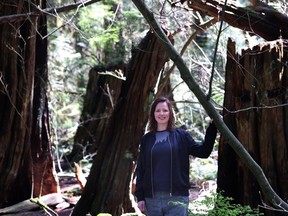Quiet trails may be a new designation in Metro Vancouver regional parks to create spaces for the restorative practice of forest bathing.

Article content
When Tara Brown lived in the city of Shibuya, one of Tokyo’s densest neighborhoods, the Vancouver-raised forestry researcher found refuge from the noisy, overcrowded urban environment through the Japanese practice of shinrin yoku, or forest bathing.
“When I went to a park, the stress got a little better,” said Brown, whose doctoral dissertation focuses on healing practice. “It impacted me so much that I trained and worked as a forest bathing guide.”
Advertisement 2
Article content
Article content
Now Brown wants to bring the restorative power of nature to users of Metro regional parks through a pilot project called Silent Trails.
The benefits of spending time in nature have been recognized by everyone from poets to philosophers to doctors.
Scientific research shows that spending time in a forest can significantly improve psychological well-being, reduce stress, anxiety and depression, strengthen the immune system and improve cardiovascular and metabolic health.
But not so much if someone walks by shouting into a cell phone, bikes pass by with music blaring from a stereo, or the sound of traffic booms just beyond the tree line.
According to acoustic ecologist Gordon Hempton, silence is an endangered species.
Investigation shows that when conscious interactions with nature are interrupted by urban noise, it is actually bad for your health.
“There is evidence that noise pollution can have a negative impact on health and increase the risk of hypertension,” Brown said.
Brown and her research partner Kristine Coster approached Metro Vancouver Regional Parks, which manages 23 parks across the region, from Bowen Island and Langley Township to Lynn Headwaters and Pacific Spirit Park, with the idea of developing trails designated as areas quiet for users seeking refuge, solace, therapeutic or restorative benefits.
Article content
Advertisement 3
Article content
Metro Vancouver Regional Parks embraced the idea, backed by a $9,000 charitable grant from the Metro Vancouver Regional Parks Foundation.
“It’s not a great wilderness experience if there’s traffic noise, dogs barking, cell phones and portable speakers,” said David Leavers, divisional manager of operational and visitor services for Metro Vancouver Regional Parks.
“We want to create spaces where people who come to enjoy nature can be acoustically protected,” Leavers said.
In 2022, Brown conducted a year-long randomized control trial of forest bathing in Vancouver parks, looking at noise, light, temperature and vegetation. There were challenges with the invasion of urban noise.
“Going to a park can lower blood pressure. But if you go to a park and you have noise pollution, it can increase your stress,” Brown said. “You want to be able to hear the birds singing and the wind rustling through the leaves. But if instead you hear lawn mowers, it is disturbing.”
In Vancouver, where there are only three designated quiet zones (Sunset Beach, Locarno and Spanish Banks), this wasn’t always possible. Respondents cited cell phone use, air traffic and even dogs as disturbances.
Advertisement 4
Article content
“I’m a dog lover, I have a dog, but they can be annoying to some people.” Even the gravel used to create paths can be loud and crunchy.
Brown is now working with Metro Vancouver Regional Parks to evaluate its trails and identify at least two (one in Metro’s eastern region, possibly Langley, and another in the west, possibly Pacific Spirit Park) that can be designated for use as quiet. roads.
“I grew up here. There are beautiful spaces for all types of recreational activities and extensive trails. We need a new designation for trains that are quiet and restful,” Brown said.
Bookmark our website and support our journalism: Don’t miss the news you need to know – add VancouverSun.com and LaProvincia.com to your favorites and subscribe to our newsletters here.
You can also support our journalism by becoming a digital subscriber — for just $14 a month, you can get unlimited access to The Vancouver Sun, The Province, National Post and 13 other Canadian news sites. Support us by subscribing today: The Vancouver Sun | The province.
Article content
